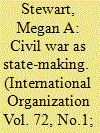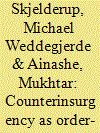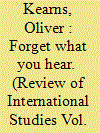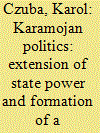|
|
|
Sort Order |
|
|
|
Items / Page
|
|
|
|
|
|
|
| Srl | Item |
| 1 |
ID:
158380


|
|
|
|
|
| Summary/Abstract |
Why do some rebel groups provide governance inclusively while most others do not? Some insurgencies divert critical financial and personnel resources to provide benefits to anyone, including nonsupporters (Karen National Union, Eritrean People's Liberation Front). Other groups offer no services or limit their service provision to only those people who support, or are likely to support, the insurgency. The existing literature examines how insurgencies incentivize recruitment by offering selective social services, yet no research addresses why insurgencies provide goods inclusively. I argue that inclusive provision of services legitimates insurgents’ claim of sovereignty to domestic and international audiences, and thus is a strategic tool secessionist rebels use to achieve their long-term goal of independence. With new and original data, I use a large-N analysis to test this hypothesis. The results of the analysis support the hypothesis, underscoring the importance insurgent nonviolent behavior and addressing key issues such as sovereignty and governance.
|
|
|
|
|
|
|
|
|
|
|
|
|
|
|
|
| 2 |
ID:
192652


|
|
|
|
|
| Summary/Abstract |
In this paper, we argue that the current insurgency and counterinsurgency discourse is dominated by concepts that are too narrow and too isolated from the wider civil war literature within which insurgency and counterinsurgency occur. Rather than accounting for the complex political processes and wide range of forces and actors that shape conflict dynamics, the dominant insurgency and counterinsurgency debate tends to reduce highly messy contexts to a competition between the often false dichotomy of insurgents and counterinsurgents, usually understood as the state versus one or more non-state violent actors. In order to understand civil war contexts like South-Central Somalia, we argue that orthodox reductionist concepts and assumptions underpinning the dominant insurgency and counterinsurgency discourse provide limited value. Building on recent critical literature, the paper proposes a refined conceptualization. Instead of understanding insurgency and counterinsurgency as peculiar forms of war, strategies, or sets of guerilla tactics, we follow Jaqueline Hazelton’s line of thought, suggesting that insurgency and counterinsurgency are mere elements of a broader process of violent order-making. Thus, insurgency and counterinsurgency are, in our view, comprehensive processes of organized challenge to and consolidation of established political order within the context of civil war.
|
|
|
|
|
|
|
|
|
|
|
|
|
|
|
|
| 3 |
ID:
183713


|
|
|
|
|
| Summary/Abstract |
As the covert and clandestine practices of states multiplied in the twentieth century, so did these practices’ footprint in public life. This footprint is not just visual and material but sonic and aural, sounding the ‘secret state’ into being and suggesting ways of ‘listening in’ on it. Using multisensory methodology, this article examines Careless Talk Costs Lives, a UK Second World War propaganda campaign instructing citizens on how to practice discreet speech and listening in defence against ‘fifth columnist’ spies. This campaign reproduced the British secret state in the everyday: it represented sensitive operations as weaving in and out of citizens’ lives through imprudent chatter about ‘hush-hush’ activities and sounds you shouldn't overhear. The paradox at the campaign's heart – of revealing to people the kind of things they shouldn't say or listen to – made the secret state and its international operations a public phenomenon. Secret sounds therefore became entangled within productions of social difference, from class inequalities to German racialisation. Sound and listening, however, are unwieldy phenomena. This sonic life of the secret state risked undermining political legitimacy, while turning public space and idyllic environments into deceptive soundscapes – for international espionage, it seemed, sounded like ordinary life.
|
|
|
|
|
|
|
|
|
|
|
|
|
|
|
|
| 4 |
ID:
174797


|
|
|
|
|
| Summary/Abstract |
This paper looks at the history of state-making in an entangled imperial frontier. The northeastern frontier of British India was a mosaic of princely states, administered and un-administered territories. The presence of the colonial state in the region was contentious, marked by violence on one hand and philanthropy on the other. The Japanese invasion of the region during World War Two had several unintended ramifications. Wartime and post-war developments produced institutions and social experiences which facilitated the process of state-making in the region. Relief and Rehabilitation project of the colonial state, and later distribution of monetary compensation was not merely governed by moral or legal obligations but was part of a larger project of imperialist reconquest in Asia after the surrender of the Japanese with Manipur and Naga Hills as the base. This project also provided the postcolonial Indian state with institutions to continue the process of state-making of its own.
|
|
|
|
|
|
|
|
|
|
|
|
|
|
|
|
| 5 |
ID:
164828


|
|
|
|
|
| Summary/Abstract |
State-making processes that occur in peripheral areas and the role that local political elites play in such processes have not been adequately explored by scholars. This article investigates these important phenomena through the lens of the Ugandan state’s presence in Karamoja, in the country’s northeast, which until the early years of the twenty-first century was very limited. Rapid extension of the power of the Ugandan state in the region, upon which the country’s rulers have embarked in the last decade, has radically altered existing governance arrangements in Karamoja and led to the formation of a subordinate Karamojan political elite. This elite has been instrumental in government efforts to establish control over the region’s population and shaped this state-making process in important ways.
|
|
|
|
|
|
|
|
|
|
|
|
|
|
|
|
| 6 |
ID:
153700


|
|
|
|
|
| Summary/Abstract |
The role of war in processes of state-making has long been hotly disputed. Although generally considered an African ‘success story’, the case of Somaliland, whose unilateral declaration of independence was embedded in violent conflict, may be instructive. Applying the conceptual prism of ‘rule standardization’, this article argues that episodes of large-scale violence were constitutive of Somaliland’s state-making trajectory. Based on theoretical reasoning and empirical findings, the article concludes that, while collective political violence is neither an angel of order nor a daemon of decay, war can be constitutive of state-making under the condition that it advances institutional and identity standardization.
|
|
|
|
|
|
|
|
|
|
|
|
|
|
|
|
| 7 |
ID:
158959


|
|
|
|
|
| Summary/Abstract |
This paper examines the institutional and functional aspects of the Taliban’s Islamic Emirate of Afghanistan (IEA). The Taliban’s coercive approach and its entire reliance on “war-making” to “state-making” shows the difficulty of the transformation of an insurgent group into a state structure. The Taliban was primarily capable of establishing a two-track system of governance. However, the assessment of the IEA’s institutional and functional capabilities shows that the military–political organization formed by the Taliban lacked statehood in all three areas of legitimacy, authority and capacity.
|
|
|
|
|
|
|
|
|
|
|
|
|
|
|
|
|
|
|
|
|